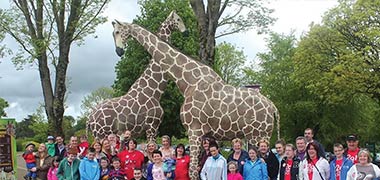Educational Development
22q11 Deletion Syndrome was only identified in the 1970s; while great advancements have been made in the care of people with 22q11, there is still much to learn. 22q11 Ireland works with medical, educational and research professionals to advance our understanding of the condition and its symptoms.
The educational path for those with 22q11 may not be straightforward. Most children with 22q11 experience some degree of developmental disability (90%), with delayed speech and language development being the most consistent feature. There is also a higher prevalence of hearing impairments (38%) in children with 22q11, as well as visual impairments and eating/drinking/swallowing impairment.
This can translate into challenges with abstract concepts like maths, difficulty understanding social cues and trouble with executive function, which can turn life’s daily tasks into hurdles. Later years can bring mental health challenges, like anxiety, which can be severely debilitating. It’s important for educators to remember that these children are often quiet in class, and can be somewhat introverted: it’s imperative that they’re not overlooked as a result.
In each person with 22q11, the combination of a vast number of potential symptoms is different. In fact, no two cases of 22q11 are ever exactly the same. School-aged children should undergo a full educational psychology assessment, as well as regular reviews.
More information on some of the symptoms experienced by those with 22q11 at different life stages can be found in our parenting section. We also recognise that the experts on 22q11 are those who experience the syndrome every day: for example, the YEEP (Young Experts by Experience Panel) group is a pioneering initiative in which research is conducted with adults with 22q11, as opposed to on them. This group provides professionals with an invaluable insight into the experience of living with 22q11.
We work closely with educational professionals throughout Ireland to help them adapt to these challenges and provide the best care and encouragement for their students with 22q11. Multidisciplinary collaboration is essential in order to optimise outcomes for children with 22q11.
On a more day-to-day level, we collate academic research, highlight training opportunities and provide vital information for educational professionals, which can be accessed through the below portal.










